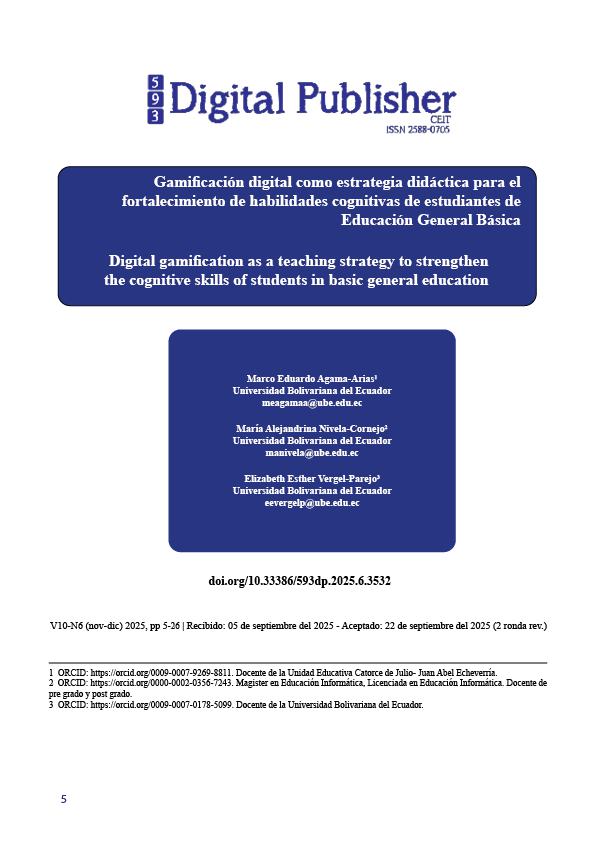Digital gamification as a teaching strategy to strengthen the cognitive skills of students in basic general education
Main Article Content
Abstract
The present study aimed to propose digital gamification as a teaching strategy to strengthen the cognitive skills of elementary school students. A mixed approach was used, descriptive scope, applied, and field design; its sample was 33 students from the 9th grade of the "14 De Julio - Juan Abel Echeverría" Educational Unit; also, 8 experts in education and technology. Two instruments were used: a questionnaire; and a semi-structured interview. As a result, when determining the students' cognitive abilities, it was found that they exhibit sustained deficits in three pillars: working memory and learning transfer; attention, planning, self-control and verification; and language and symbolic representation. In particular, the evidence points to a widespread deficiency in key cognitive skills such as memory, executive control, and linguistic/symbolic literacy. A teaching strategy based on digital gamification was designed to strengthen the cognitive skills of 9th grade students. The proposal is organized into thematic modules for the progressive development of cognitive skills; memory, attention, and reasoning tasks are combined with language and symbolic representation exercises, so that students experience the interdependence between them. Upon validating the design of the proposed teaching strategy, it was found to be solid and viable, with a pedagogical design that favors motivation and the development of cognitive skills. In conclusion, digital gamification, implemented as a teaching strategy for 9th-grade students at the "14 De Julio – Juan Abel Echeverría" Educational Unit, is a solid and viable proposal for strengthening cognitive skills.
Downloads
Article Details

This work is licensed under a Creative Commons Attribution-NonCommercial-ShareAlike 4.0 International License.
1. Derechos de autor
Las obras que se publican en 593 Digital Publisher CEIT están sujetas a los siguientes términos:
1.1. 593 Digital Publisher CEIT, conserva los derechos patrimoniales (copyright) de las obras publicadas, favorece y permite la reutilización de las mismas bajo la licencia Licencia Creative Commons 4.0 de Reconocimiento-NoComercial-CompartirIgual 4.0, por lo cual se pueden copiar, usar, difundir, transmitir y exponer públicamente, siempre que:
1.1.a. Se cite la autoría y fuente original de su publicación (revista, editorial, URL).
1.1.b. No se usen para fines comerciales u onerosos.
1.1.c. Se mencione la existencia y especificaciones de esta licencia de uso.
References
Anggraeni, D., Prahani, B., Suprapto , N., Shofiyah, N., & Jatmiko, B. (2023). Revisión sistemática de la investigación sobre aprendizaje basado en problemas para el fomento del pensamiento crítico. Habilidades de Pensamiento y Creatividad, 49. https://www.sciencedirect.com/science/article/abs/pii/S1871187123001037
Barsoum, S., Elnagar, M., & Awad, B. (2022). La eficacia del uso de un chatbot basado en estilos cognitivos para el desarrollo de conceptos científicos y habilidades de pensamiento crítico en alumnos de educación preparatoria. Revista Científica Europea, ESJ, 18(22), 432-448. https://eujournal.org/index.php/esj/article/view/15610
Beck, L. (1992). Csikszentmihalyi, Mihaly. (1990). Flujo: La psicología de la experiencia óptima. Revista de Investigación del Ocio, 24 (1), 93–94. https://doi.org/10.1080/00222216.1992.11969876
Borja, K., Cumbajín, P., & Bravo, J. (2025). Desarrollo de la psicomotricidad gruesa a través de la aplicación de las rondas infantiles. Simbiosis, 5(9), 89-100. https://revistasimbiosis.org/index.php/simbiosis/article/view/171
Chávez, J., Reyes, V., Sequera, A., Davelouis, P., & Ríos, W. (2024). Efectos de la gamificación sobre el pensamiento crítico en estudiantes de primaria. Prohomino. Revista de Ciencias Sociales y Humanas, 6(4), 110-120. https://ve.scielo.org/scielo.php?pid=S2665-01692024000400110&script=sci_arttext&tlng=en
Deci, E. y Ryan, R. (1985). Conceptualizaciones de la motivación intrínseca y la autodeterminación. En Motivación intrínseca y autodeterminación en el comportamiento humano (pp. 11-40). Boston, MA: Springer US. https://link.springer.com/chapter/10.1007/978-1-4899-2271-7_2
Driscoll, M., & Burner, K. (2024). Fundamentos psicológicos del diseño instruccional. En Tendencias y problemas en el diseño instruccional y la tecnología. 5.ª edición. Roudledge. https://www.routledge.com/Trends-and-Issues-in-Instructional-Design-and-Technology/Carr-Chellman-Dempsey-Reiser/p/book/9781032819754.
Ghoulam, K., & Bouikhalene, B. (2024). Evaluación del impacto de la gamificación en el desarrollo de habilidades cognitivas en la educación superior: Un estudio de caso sobre estudiantes de electrónica y sensores. Revista de Educación en Tecnologías de la Información: Investigación, 4(2), 96-109. https://doi.org/10.5281/zenodo.12730409
Ibisu, A. (2024). Desarrollo de un modelo de gamificación para el aprendizaje electrónico personalizado. (Tesis de Maestría). Cornell University. https://arxiv.org/abs/2404.15301.
Lampropoulos, G., & Kinshuk, K. (2024). Realidad virtual y gamificación en educación: una revisión sistemática. Education Tech Research Dev, 72, 1691–1785. https://doi.org/10.1007/s11423-024-10351-3
Nordby, A., Vibeto, H., Mobbs, S., & Sverdrup, H. (2024). Pensamiento sistémico en la gamificación. SN Computer Science, 5(3). https://link.springer.com/article/10.1007/s42979-023-02579-2
Preciado, T., Preciado, M., Mendoza, M., & Recalde, F. (2024). La Gamificación como Motivador Didáctico en Aulas Públicas de Inglés como Lengua Extranjera (EFL) de Bajos Recursos en Ecuador. Ciencia Latina: Revista Multidisciplinar, 8(2), 5391-5402. https://dialnet.unirioja.es/servlet/articulo?codigo=9565941
Prensky, M. (2003). Aprendizaje digital basado en juegos. Computadoras en el entretenimiento (CIE), 1 (1), 21-21. https://dl.acm.org/doi/abs/10.1145/950566.950596
Renacido, J., & Biray, E. (2025). El aprendizaje electrónico como vehículo global hacia una educación inclusiva y de calidad. En Impulsando los Objetivos de Desarrollo Sostenible con Tecnología Educativa (págs. 209-276). IGI Global Scientific Publishing.
Shekh-Abed, A. (2025). Autoconocimiento metacognitivo y habilidades cognitivas en el aprendizaje basado en proyectos de estudiantes de electrónica de secundaria. Revista Europea de Educación en Ingeniería, 50(1), 214-229. https://www.tandfonline.com/doi/full/10.1080/03043797.2024.2374479
Sikora, Y., Chernykh, V., Shaforost, Y., Danylyuk, S., & Chemerys, I. (2024). Aprovechamiento de la gamificación y las tecnologías basadas en juegos con fines educativos. Multidisciplinary Reviews, 7. https://doi.org/10.31893/multirev.2024spe008
Terzieva, T., Rahneva, O., & Dilyanov, V. (2021). Estrategias pedagógicas para el desarrollo de habilidades cognitivas en un entorno digital. Revista Internacional de Ecuaciones Diferenciales y Aplicaciones, 20(2), 251-261. https://remia2021.fmi-plovdiv.org/wp-content/uploads/2021/10/3_3_13_RT_Section-C_Terzieva_Rahneva_Dilyanov_237_238.pdf
Vygotsky, L. S. (1978). Mind in society: The development of higher psychological processes (Vol. 86). Harvard university press. https://books.google.co.ve/books?id=RxjjUefze_oC&printsec=frontcover&hl=es#v=onepage&q&f=false
Waterman, A. (2025). Sobre la motivación intrínseca, el flujo y la absorción: una nueva perspectiva teórica. Revista de Psicología Positiva, 20(4), 644-651. https://www.tandfonline.com/doi/abs/10.1080/17439760.2024.2394445




